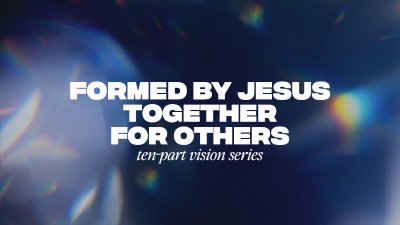Throughout the storyline of the Bible, we see that God’s desire is to bless all of humanity. It starts with Adam and Eve, but rather than spread God’s blessing and goodness to the world, they spread sin and death. But God doesn’t leave humanity hopeless and helpless.
Instead, he chooses the people group of Israel to provide blessing and healing to the rest of the world. As a nation of people set apart by God, Israel was given the unique opportunity of allowing God to bless the whole world through them. Today, we have the same opportunity. But rather than waiting for the nations to come to us, Jesus’ last command while on earth was to go to the nations ourselves.
As we allow ourselves to be formed by Jesus, we must remember that we do this for the sake of others and not just for our own self-improvement. We also must remember that God’s intention is to restore all of humanity from all nations. By intentionally praying for the nations, giving sacrificially, and by actually going to the nations, we can continue God’s work of providing blessing and salvation to the rest of the world.

For Others Around the World - Vision Series E10
October 2, 2022 • Trey Van Camp • Genesis 12:1–3, Revelation 7:9
For Others at the Workplace - Vision Series E9
September 25, 2022 • Trey Van Camp • Genesis 12:1–3, Revelation 7:9
Our workplace is one of the most strategic places where we can effectively share the gospel. We spend roughly 1/3rd of our life there, we regularly interact with the same people there, and we contribute to the well-being of society by what we do there. However, most of us also have negative feelings and experiences associated with work. We wake up, toil, grind, and come home exhausted only to do it again the next day. Or we work tirelessly to get more power, approval, security, and comfort. At its best, work is a necessary evil. At its worst, work is a false god that never gives us what it promises. But the way of Jesus provides us an alternative: to see our work as the means by which God uses us to restore beauty, goodness, and well-being to the world around us. By seeing our work through this lens of restoration, we can start detaching ourselves from these lies about work and begin utilizing our workplaces to invite other into the way of Jesus. Rather than living to work and working to live, followers of Jesus can love to work and work to love.
For Others in the Neighborhood - Vision Series E8
September 18, 2022 • Trey Van Camp • Mark 2:13–17
It is becoming increasingly difficult to share the way of Jesus with our lost neighbors. Political tribalism, spiritual suspicion, and the recent phenomenon of religious deconstruction all form a perfect storm of hostility towards Christians who try to invite others to follow Jesus. In Jesus’ day, the world was much the same. But rather than combat or retreat from the world, Jesus confronts the world’s hostility with hospitality. The meals that Jesus shared with others were invitations to relationship, opportunities for reconciliation, and a demonstration of the love that God has for all people. Today our mission and outreach must come from our discipleship to Jesus, and not the other way around. This means that we must learn the practice of hospitality as a way to invite others to witness the love of God. When we share a meal with others, we remind ourselves that God chose to seat us at his table in the Kingdom despite our sin. We also demonstrate to our neighbors that the love of God is on offer to everyone who wants to accept it.
Together as Family - Vision Series E7
September 11, 2022 • Trey Van Camp • Titus 2:1–8
In our day and age, healthy relationships built on mutual love and service between generations are rare. We easily find ourselves frustrated with the problems left behind by those older than us, or frustrated by the ambition and naiveite of those younger than us. But these frustrations only keep us stuck in our own struggles and fears. Those in their first half of life find themselves ambitious, but lonely. Those in their second half of life find themselves faithful, but angry. In Titus 2, Paul gives practical instruction on how we can overcome these frustrations by mending our relationships. When we commit to listening to and learning from others in different life stages, we complete the family of Christ and act as an alternative community who prizes each other’s gifts and stages.





